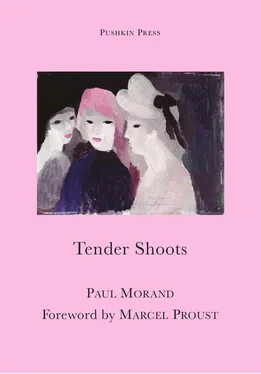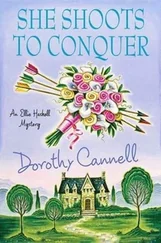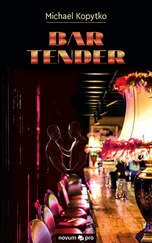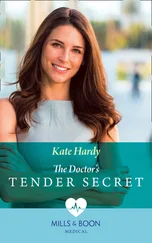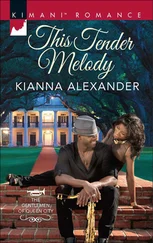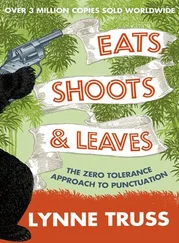Paul Morand - Tender Shoots
Здесь есть возможность читать онлайн «Paul Morand - Tender Shoots» весь текст электронной книги совершенно бесплатно (целиком полную версию без сокращений). В некоторых случаях можно слушать аудио, скачать через торрент в формате fb2 и присутствует краткое содержание. Год выпуска: 2011, Издательство: Pushkin Press, Жанр: Классическая проза, на английском языке. Описание произведения, (предисловие) а так же отзывы посетителей доступны на портале библиотеки ЛибКат.
- Название:Tender Shoots
- Автор:
- Издательство:Pushkin Press
- Жанр:
- Год:2011
- ISBN:нет данных
- Рейтинг книги:5 / 5. Голосов: 1
-
Избранное:Добавить в избранное
- Отзывы:
-
Ваша оценка:
- 100
- 1
- 2
- 3
- 4
- 5
Tender Shoots: краткое содержание, описание и аннотация
Предлагаем к чтению аннотацию, описание, краткое содержание или предисловие (зависит от того, что написал сам автор книги «Tender Shoots»). Если вы не нашли необходимую информацию о книге — напишите в комментариях, мы постараемся отыскать её.
Tender Shoots — читать онлайн бесплатно полную книгу (весь текст) целиком
Ниже представлен текст книги, разбитый по страницам. Система сохранения места последней прочитанной страницы, позволяет с удобством читать онлайн бесплатно книгу «Tender Shoots», без необходимости каждый раз заново искать на чём Вы остановились. Поставьте закладку, и сможете в любой момент перейти на страницу, на которой закончили чтение.
Интервал:
Закладка:
“The forest warden is a friend. I imagine you’ll get undressed too?”
I refuse to. She takes me by the hand, leads me over to a hut covered in dried oak branches. Squatting in front of me, she rekindles the fire, lays the frying pan between two stones and cooks bacon and eggs. I am not used to seeing her like this, her knees black with earth, her hands oily, dirty and unadorned, her tunic pulled up, revealing to the rosy sunlight polished, muscular thighs, those exquisite recesses that a long family inheritance had made so secret and so desirable to me.
I have to give in to Aurora and I take off my socks, my collar. At a glance from her, I relinquish my braces. And here I am undressed in turn with, on my neck, the red mark from my stiff collar, on my legs, the blue mark from my suspenders, blinded by the acrid smoke of the fresh herbs, and like a general in a kepi, stripped by the Touaregs, naked, but still wearing his crown of oak leaves.
Wood pigeons dart through the sky. Aurora takes my stick, aims at them, fires twice, but the birds continue, in a hurry to arrive at Nelson’s column before nightfall.
“I was born in Canada,” Aurora says, “on the lakes. The men there use coloured flies to catch large salmon, which two men carry back between them having passed a stick through the gills. Women give of themselves freely upon beds of white heather. I became poor very young with all that a fortune used up within a few years is worth to us in experience and pleasure. My parents are both dead. They came from Westmoreland originally. My mother had been very beautiful. I scarcely knew her. She had the smallest foot in the world (I could not fit even a toe into any of her shoes). She had black hair and the complexion of a heroine from The Keepsake.
“Like waves on a lake came her hair
To die on the strand of her brow,
“Wordsworth has written. When she came to London for the season, she broke every heart. But she loved my father. She followed him to Canada when he decided to live there. She spent most of her life in bed and died young.
“I get my feelings for the wild from my father. He used to allow me to climb trees, and cliffs from the top of which I took gulls’ eggs, and from the bottom, seashells. I always went with him when he went hunting. From my earliest childhood he put me on a horse. I followed him like a dog. And my education was really that of a hunting dog. I learned to judge cities from their smell, people by their footsteps, to know which way the wind is blowing, to retrieve game from the most difficult places, and in midwinter I would wade into the water up to my waist to search for the ducks he shot and that fell into the lakes. I can still see him waiting on the shore with his checked trousers, his velvet cap with flaps and his duck-shooting gun; he smiled into his white beard.”
I am very cold, but I want to stay here this evening. I have discarded the man-about town; the simple life is good and beautiful; I am giving up my room in Mayfair and the steaming bath that is being run for me at this moment and my fresh, starched shirt that awaits me, unfolded, on the bed. I am relinquishing the benefits of clothes with padded shoulders, of sleek hair, of witty conversation. I do not care about a salary at the end of the month, a pension in my later years, I have no further needs, I expect nothing from anyone, social upheavals do not frighten me and I despise working people who need cinemas and drinks. All I own are the two hundred and eight pieces of my skeleton. I am on a level with the earth, the first to benefit from the magnetic currents in the ground; I am the one burning all the oxygen in the air. It is Aurora whom I shall rely on to look after me, to think healthily and to live according to the law of nature.
“Good night, child,” she says. “May God watch over you!”
She leaves me to this nocturnal journey as if it were a perilous enterprise from which we may not return. Already, I can hear trumpets sounding. The pure air anaesthetises me; I am sleeping beneath the sky for the first time in my life.
I have acquired a sore throat from sleeping out in the open. Aurora is making me herbal teas by the fire, in the studio. Then she says:
“I arrived in India in the autumn of 1909, sailing from Aden. One autumn morning, on a tin-plate sea over which our speed had been cut to twelve knots, Bombay turned its brick façade towards me. Like a silk canopy, the sky stretched out above the factory chimneys, to the right, and to the left, the Elephanta rocks. The trail of smoke in the sky altered less than did the wake from the propellers in the water.
“I stayed on the peninsula for six weeks. I yearned for solitude, for treks in the dry air, which were not satisfied by remaining on low-lying land. The rivers were like corrosive swamps for me, and the ports were dreadfully depressing. I loathe suffocating valleys where there are only small creatures to hunt. I resolved to set off for Kashmir, then Tibet. Leaving Srinagar, I arrived in a country of high lakes, planted with fir trees. The higher we climbed, the lower the temperature dropped. The natives, overcome with torpor, slept as they walked. I had to whip them to wake them up. Cutting out steps in the ice, we continued to climb …”
Aurora points to the studio window from where night was about to fall, for a few all too brief hours. Then her hand took mine once more. Why should it have need of mine, this hand which cuts steps in the ice, which bends pennies as if they were marshmallow? Here are her feet that have only ever worn sandals, that have trod the burning snow, the red sand of Somaliland and scattered the underground palaces of ants in Gabon which, at night, spend their time sawing the earth in two.
Over her body has passed ice, salt, rain, mud, sweat, showers, perfumes. Iron, lead, stone have inscribed wounds on it. In my hands I hold her round head, hard as a paving stone and her thick hair does not deaden the touch. Incomparable caress over the short, bushy hair, which, layered initially by the scissors, ends abruptly on the neck shorn by the clippers. I burnish my fingers on her granite forehead, then on her cheekbones that protrude like pebbles. While she talks, I amuse myself by moving her arms and legs about. The muscles fluctuate silently.
Aurora is covered in scars. One by one I point them out to her and she explains. Here, trampled by a buffalo in Rhodesia; there, in Carolina, a dangerous double jump with her horse, beneath which she was left as if for dead. This hole in her head, a fall at the Olympia, at the bottom of a trap door.
So many accidents and so few adventures. Such a lot of shipwrecks and so great a love of ships, of departures, of all of life if life is movement. No habits — just a few cooking recipes, a few tips on hygiene. A courage acquired from meals without meat, from rooms without heating. So much goodness; silent, practical goodness; basic teaching that I had never been given, that you won’t find written down anywhere. Finally, an organic gaiety that never changes, drawn from the oxygen in the air and reproduced all around, the kind of gaiety that endears one more than vice, snobbery or love. A soul cleansed like the body, like the barrels of a gun; helpful hands, a generous heart, a transformer of energy; sweet fruit of the earth, product of my quest, precious beast momentarily captured, Aurora …
Aurora has rented a shed in Dulwich where she has deposited her saddlery and her hunting and fishing equipment. She also has a few wild beasts’ heads at a taxidermist’s shop in Covent Garden. But her real wealth, her guns, they are at Kent’s.
They are shapeless things, wrapped up in old cloths, makeshift bandages for steel damaged by oxidation. But as Aurora unwinds the strips, the weapon appears gleaming and primed. Aurora places on her index finger, in perfect balance, a Holland and Holland sixteen-bore rifle. The barrel is blue. The screws, loosened, inactive, can be turned by the fingernail. The gun, with a duplex-choke, is shaped initially in a rounded horse-pistol butt from which the straight barrel emerges. Carried beneath its heavy belly, like pointed eggs, are the reinforced bullets.
Читать дальшеИнтервал:
Закладка:
Похожие книги на «Tender Shoots»
Представляем Вашему вниманию похожие книги на «Tender Shoots» списком для выбора. Мы отобрали схожую по названию и смыслу литературу в надежде предоставить читателям больше вариантов отыскать новые, интересные, ещё непрочитанные произведения.
Обсуждение, отзывы о книге «Tender Shoots» и просто собственные мнения читателей. Оставьте ваши комментарии, напишите, что Вы думаете о произведении, его смысле или главных героях. Укажите что конкретно понравилось, а что нет, и почему Вы так считаете.
